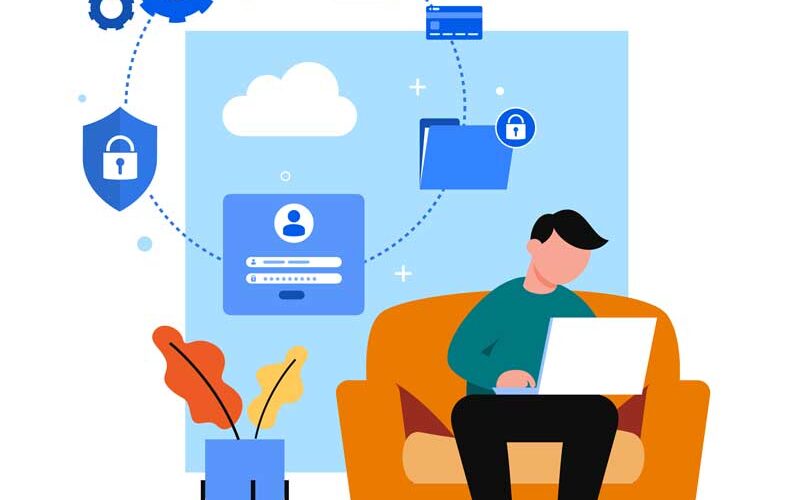In today’s interconnected world, digital privacy has become a fundamental necessity as we increasingly rely on technology for daily activities. The rapid adoption of digital platforms, smart devices, and artificial intelligence has created a landscape where our personal information can easily be accessed, monitored, or exploited. From online banking to social media interactions, the vast amount of data generated daily underscores the critical need for robust privacy measures. Protecting digital privacy ensures our security, personal freedom, and control over sensitive data, enabling us to engage confidently in the digital realm. This article will explore the various dimensions of digital privacy, including its role in personal security, its impact on online reputation, the challenges posed by targeted advertising, and the emerging risks in new technologies. By understanding these aspects, we can better appreciate the importance of safeguarding our digital lives.
Why Digital Privacy Matters
One of the most significant aspects of digital privacy is safeguarding personal security. Personal details, such as names, addresses, and financial information, are prime targets for cybercriminals. Unauthorized access to this data can lead to identity theft and financial fraud, causing lasting emotional and financial repercussions for victims. Implementing tools like Virtual Private Networks (VPNs) can help encrypt online activities and prevent tracking or interception (Kisters, 2023). Furthermore, educating users about phishing scams and password management can create an additional layer of defense against data breaches.
Additionally, digital privacy plays a crucial role in preserving one’s online reputation. As highlighted in OriginStamp, individuals must control how their digital footprint appears to others, such as potential employers or peers. Inappropriate or outdated online content can lead to unfavorable judgments, impacting career and personal opportunities. Careful management of privacy settings on social media and sharing only necessary information helps maintain a positive image (Kisters, 2023). Regularly auditing one’s online presence ensures that personal and professional boundaries are respected.
Avoiding Targeted Advertising and Manipulation
Companies and advertisers collect enormous amounts of data to influence consumer behavior through targeted advertising. While this may seem harmless, it raises concerns about manipulation and autonomy. Excessive data collection can lead to intrusive ads that create a sense of being constantly watched, eroding trust in digital platforms. Using privacy tools like browser extensions to block tracking scripts can help regain control over shared data (Skebaite, 2023). Moreover, legislation such as the General Data Protection Regulation (GDPR) plays a vital role in curbing unethical data collection practices, giving consumers more control over their digital identities.
Digital Privacy in Emerging Technologies
Emerging technologies such as the Internet of Things (IoT) and artificial intelligence (AI) have revolutionized convenience but come with privacy risks. IoT devices collect personal data continuously, sometimes without users’ knowledge, ranging from health metrics to location data. Securing these devices with unique passwords and regularly updating software reduces vulnerabilities (Kisters, 2023; Tobin, 2023). Additionally, users should disable unnecessary data collection features to minimize exposure. AI algorithms that analyze data to make decisions further emphasize the need for transparent data collection practices. Ensuring that these algorithms adhere to ethical standards can prevent misuse of personal information.
Reshaping a Privacy-Conscious Society
Promoting awareness about digital privacy empowers individuals to take control of their personal information. Sharing knowledge about cybersecurity measures—such as two-factor authentication, secure browsing, and avoiding untrusted platforms—encourages safer online habits. Additionally, governments and organizations must continue to enforce policies that uphold privacy rights (Powell, 2023). Initiatives like global privacy awareness campaigns and community-driven digital literacy programs can play a pivotal role in fostering a culture of privacy-conscious behavior. By embedding digital privacy education into school curriculums, future generations can be better equipped to navigate the complexities of the digital age.
Conclusion
Digital privacy is vital for protecting personal security, maintaining autonomy, and avoiding data misuse in an increasingly connected world. By adopting proactive measures, such as using encryption tools, securing devices, and spreading awareness, individuals can navigate the digital age safely. As technology continues to evolve, safeguarding privacy will remain a cornerstone of digital empowerment. With collective effort and vigilance, we can create a safer, more trustworthy digital environment for all. Furthermore, as digital threats continue to advance, ongoing research and innovation in privacy technologies will be essential in staying ahead of potential risks. It is crucial that society prioritizes digital privacy, ensuring that future generations can enjoy the benefits of technology without compromising their fundamental rights.
References
Kisters., S., 2023., Understanding the Significance of Digital Privacy. [online] originstamp.com. Available at: https://originstamp.com/blog/understanding-the-significance-of-digital-privacy/. [Accessed 14 December 2024].
Skebaite., A., 2024., What is digital privacy, and how should we protect it? [online] Available at: https://nordvpn.com/ko/blog/digital-privacy/ [Accessed 14 December 2024].
Tobin., D., 2024., What is Data Privacy—and Why Is It Important? [online] Integrate.io. Available at: https://www.integrate.io/blog/what-is-data-privacy-why-is-it-important/. [Accessed 14 December 2024].
Powell., L., 2023., The Importance of Online Privacy in the Digital Age. [online] Medium. Available at: https://medium.com/@th3Powell/the-importance-of-online-privacy-in-the-digital-age-c4e446fddb3e. [Accessed 14 December 2024].
